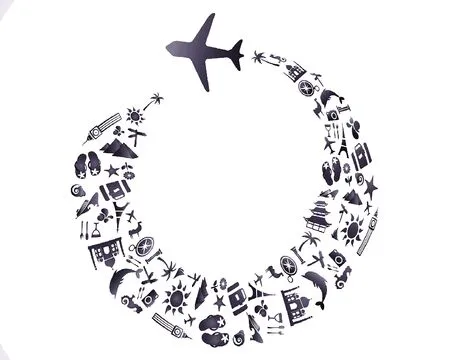For a More Creative Brain, Travel
Brent Crane

There are plenty of things to be gained from going abroad: new friends, new experiences, new stories.
But living in another country may come with a less noticeable benefit, too: Some scientists say it can also make you more creative.
Writers and thinkers have long felt the creative benefits of international travel. Ernest Hemingway1. Ernest Hemingway: 欧内斯特·海明威(1899—1961),美国作家和记者,被认为是20世纪最著名的小说家之一。, for example,drew inspiration for much of his work from his time in Spain and France. Aldous Huxley, the author ofBrave New World, moved from the U.K. to the U.S. in his 40s to branch out into screenwriting.2. Aldous Huxley: 阿道司·赫胥黎(1894—1963),英国作家,以小说和大量散文闻名于世;Brave New World:《美丽新世界》,由阿道司·赫胥黎于1932年创作,是20世纪最经典的“反乌托邦”文学之一;branch out: 扩展范围;screenwriting: 电影剧本创作。Mark Twain, who sailed around the coast of the Mediterranean in 1869, wrote in his travelogueInnocents Abroadthat travel is “fatal to prejudice, bigotry,and narrow-mindedness.”3. Mark Twain: 马克·吐温(1835—1910),美国著名作家和演说家,是美国批判现实主义文学的奠基人;the Mediterranean: 地中海;travelogue: 旅行见闻讲演,游记;Innocents Abroad:《流浪汉在海外》;bigotry: 偏执,顽固;narrow-mindedness: 目光短浅。
In recent years, psychologists and neuroscientists have begun examining more closely what many people have already learned anecdotally:4. neuroscientist: 神经学家;anecdotally:轶事地。that spending time abroad may have the potential to affect mental change. In general,creativity is related to neuroplasticity5. neuroplasticity: 神经可塑性,指由于经验原因引起的大脑的结构改变。这是近期的发现,过去的科学家一般认为在婴儿关键期后,大脑结构不会发生变化。, or how the brain is wired. Neural pathways are influenced by environment and habit, meaning they’re also sensitive to change: New sounds, smells, language, tastes, sensations, and sights spark different synapses in the brain and may have the potential to revitalize the mind.6. 神经通路会受到环境和习惯的影响。这就意味着它们会对变化敏感:新的声音、气味、语言、味道、情感以及景物会触发大脑中的不同突触,这有可能激发大脑的活力。neural pathway: [解剖]神经通路;sights: 风景,名胜;spark: 激发;synapse: [解剖]突触;revitalize:使恢复生气,注入新的活力。
如今,出国旅行屡见不鲜,特别是在像中国这样一些经济快速发展、观念日益开放的国家里,人们到国外去旅行已蔚然成风。不少人都认为出国旅行令人见多识广,科学家们更指出这种经历有可能给人带来心智上的变化。那么,出国旅行是如何让人大开眼界、具有创新思维的呢?下面这篇文章将给我们一些答案。
“Foreign experiences increase both cognitive flexibility and depth and integrativeness of thought, the ability to make deep connections between disparate forms,” says Adam Galinsky, a professor at Columbia Business School and the author of numerous studies on the connection between creativity and international travel.7. cognitive flexibility: 认知灵活性;integrativeness: 综合,集成;disparate: 不同的;numerous: 许多的,大量的。Cognitive flexibility is the mind’s ability to jump between different ideas, a key component of creativity. But it’s not just about being abroad, Galinsky says: “The key, critical process is multicultural engagement, immersion8. immersion: 沉浸,投入。, and adaptation. Someone who lives abroad and doesn’t engage with the local culture will likely get less of a creative boost than someone who travels abroad and really engages in the local environment.”9. 相对于那些去国外旅行并且主动融入当地环境的人而言,那些居住在国外、却不主动融入当地环境的人更难提高创造力。boost: 提高,改善。In other words, going to Cancun10. Cancun: 坎昆,是墨西哥东南部一个城市,位于加勒比海沿岸,是世界著名的度假胜地。for a week on spring break probably won’t make a person any more creative. But going to Cancun and living with local fishermen might.
Cultural distance, or how different a foreign culture is from one’s own, may also play a role: Surprisingly, Galinsky and his colleagues found that living someplace with a larger cultural distance was often associated with lower creativity than living in a more familiar culture. The reason for that, they hypothesized, was that an especially different culture might come with a bigger intimidation factor, which may discourage people from immersing themselves in it11. hypothesize: 假设,猜测;intimidation:恐吓,威胁;discourage: 阻止,使气馁。—and no immersion, they explained, could mean none of the cognitive changes associated with living in another country.

Traveling may have other brain benefits, too.Mary Helen Immordino-Yang, an associate professor of education and psychology at the University of Southern California, says that crosscultural12. cross-cultural: 跨文化的。experiences have the potential to strengthen a person’s sense of self. “What a lot of psychological research has shown now is that the ability to engage with people from different backgrounds than yourself, and the ability to get out of your own social comfort zone, is helping you to build a strong and acculturated sense of your own self,” she says.13. 她说道:“诸多心理学研究显示,能够与不同文化背景的人打成一片,并走出心理上的社交舒适区,将有助你形成一种强有力的内在文化适应力。”acculturated: 适应新的文化习俗的。“Our ability to differentiate our own beliefs and values is tied up in the richness of the cultural experiences that we have had.”14. differentiate: 区分,区别;tie up: 与……有密切联系。
Cross-cultural experiences have the potential to pull people out of their cultural bubbles, and in doing so, can increase their sense of connection with people from backgrounds different than their own.“We found that when people had experiences traveling to other countries it increased what’s called generalized15. generalized: 广义的,普遍的。trust, or their general faith in humanity,” Galinsky says. “When we engage in other cultures,we start to have experience with different people and recognize that most people treat you in similar ways. That produces an increase in trust.”
Of course, although a new country is an easy way to leave a “social comfort zone,” the cultural engagement associated with cognitive change doesn’t have to happen abroad. If a plane ticket isn’t an option,maybe try taking the subway to a new neighborhood. Sometimes,the research suggests, all that’s needed for a creative boost is a fresh cultural scene.

